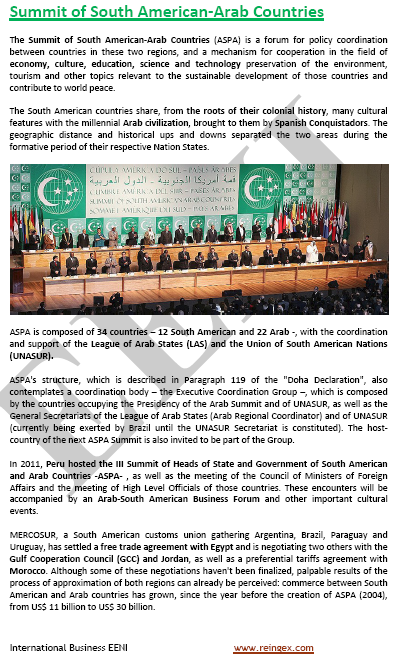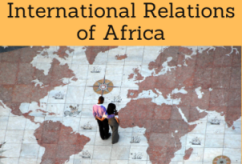Summit South American-Arab Countries (ASPA)

ASPA (South American-Arab Countries) Egypt, Jordan, Kuwait
- Introduction to the Summit of South American-Arab Countries
- Organizational Chart and Coordination Structure of the Summit of South American-Arab Countries
- III Summit of Heads of State and Government of the South American and the Arab Countries
- Lima, Brasilia, Rabat, and Doha Declarations
- Role of the UNASUR and the League of Arab States
- Sixth meeting of the Council of senior officials of the Summit of South America-Arab Countries
Sample - Summit of South American-Arab Countries (ASPA)

The aims of the subject “Summit of South American-Arab Countries (ASPA)” are the following:
- To understand the objectives of the Summit of South American-Arab Countries
- To know the functioning of the ASPA
- To analyze the areas of cooperation of the Summit of South American-Arab Countries

The Subject “Summit of South American-Arab Countries (ASPA)” belongs to the following Online Programs taught by EENI Global Business School:
Courses: Islam & Business, International Relations of Africa.

Master in Business in Africa, International Business, Foreign Trade.

Doctorate: Islamic Business, African Business, Ethics, Religion & Business.
Languages:  or
or  Cumbre América del Sur-Países Árabes (ASPA)
Cumbre América del Sur-Países Árabes (ASPA)  Sommet Amérique du Sud-pays arabes (ASPA)
Sommet Amérique du Sud-pays arabes (ASPA)  Cúpula América do Sul-Países Árabes (ASPA).
Cúpula América do Sul-Países Árabes (ASPA).

The Summit of South American-Arab Countries (ASPA) consists of thirty-four countries with the coordination and support of the Arab League and the UNASUR.
The Arab League is a regional organization of the Arab States in the MENA Region (Middle East and North Africa).
- The members of the Arab League are Algeria, Bahrain, Comoros, Djibouti, Egypt, Iraq, Jordan, Kuwait, Lebanon, Libya, Mauritania, Morocco, Oman, Palestine, Qatar, Saudi Arabia, Somalia, Sudan, Syria, Tunisia, UAE, and Yemen
- All of them are Muslim countries
The member countries of the Union of South American Nations (UNASUR) are Argentina, Brazil, Bolivia, Colombia, Chile, Ecuador, Guyana, Paraguay, Peru, Suriname
me, Uruguay, and Venezuela.- All the countries are Christians except Suriname
- The Third Summit of South American Presidents attested the political creation of the UNASUR
The Union of South American Nations (UNASUR) will be consolidated through the gradual convergence of the Andean Community and the MERCOSUR and Chile, together with Guyana and Suriname.
BRASILIA DECLARATION.
By invitation of Luiz Inácio Lula da Silva, former President of Brazil, the Heads of State of the South American and the Arab countries joined in Brasilia, with the objective of strengthening the bi-regional trade relations.
The Summit of South American-Arab Countries (ASPA) is an inter-civilization agreement between the Islamic Civilization and the Western Civilization (Latin American Economic Area).

(c) EENI Global Business School (1995-2024)
We do not use cookies
Top of this page


